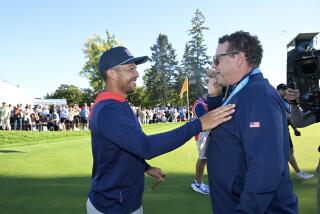Volleyball Coach Delivers a Winner : But Dunphy Still Paces, Awaiting Another Key Moment
- Share via
Marv Dunphy, coach of the U.S. men’s volleyball team, paced like an expectant father last week, waiting for word of his team’s progress at the World Cup in Japan.
Dunphy wasn’t with the team because he is an expectant father, waiting for his wife Su to deliver the couple’s first child.
Su still hasn’t delivered, but the team returned to its home base of San Diego late Monday night as the World Cup champion.
While Dunphy communicated daily over the phone with assistant coach Gary Sato, the Americans swept unbeaten through the eight-team, round-robin tournament, a quadrennial event that many volleyball people consider to be equal in stature to the Olympics and the world championships.
The Americans’ victory, in fact, probably provided a truer indication of their strength than the Olympic gold medal they won last year at Long Beach.
The Soviet Union, which boycotted the Los Angeles Games, had won every major tournament it had entered since losing in the Olympic final at Montreal in 1976. But the Americans beat the Soviets at Japan in a 3-hour, 40-minute marathon. The Soviets led in the fifth game, 11-5, before the Americans rallied to win, 15-12.
“This kind of clears the air,” middle blocker Craig Buck said of the U.S. team. “It kind of sets up the fact that this is the American era in volleyball for a while.”
The United States, which had never finished higher than seventh in this event, used the same starting lineup that won the Olympic gold medal: Buck, Karch Kiraly, Pat Powers, Steve Timmons, Dusty Dvorak and Aldis Berzins, who announced earlier that he was retiring after the tournament.
Kiraly was named the tournament’s most valuable player, while Dvorak was honored as the best setter and Berzins was named the best receiver. Kiraly, Dvorak and Berzins also were named to the six-man all-tournament team.
And Sato, who had left coaching and was applying for chiropractic school when Dunphy asked him last February to be his assistant, was named the tournament’s most valuable coach.
Sato and Dunphy spoke for about 30 minutes each day, poring over scouting reports and mapping out strategy while running up a monstrous phone bill.
Said Dunphy, who then had to sit around and wait for Sato to call him with the results of the matches: “It was kind of like rolling a bowling ball and then not knowing for several hours how many pins you hit.”
Sato said his first challenge was reassuring the players, whom he said were upset that Dunphy was staying home. “They were pretty emotional when we got on the plane,” Sato said, “so I had to take care of that right away.”
Buck, however, said: “We all understood the situation. Marv did what anybody else should do.”
After first playing in the Korea Cup--they finished third behind the Soviet Union and France--the Americans had to play their first two matches in the World Cup within about a 15-hour period. They swept three straight games from Brazil, last year’s Olympic silver medalist, then had to come back and face the Soviets about 12 hours later.
The Americans had beaten the Soviets 10 times in 13 matches over the last two years, but the Soviets had beaten them in Korea. “It was kind of like a slap in the face,” Buck said of the loss in Korea.
The rematch in Japan, Buck said, “was kind of a 15-round punch-fest. We took one, they took one, we took one.”
The Americans finally survived, but their toughest match of the tournament took place a few days later against Argentina. In that one, the Argentines had a two-games-to-one advantage and twice swung for the match with a 14-11 lead in the fourth game, but the Americans covered themselves both times and finally got a set to Kiraly, who ended the rally with a put-away. The Americans, playing without Timmons, who had muscle spasms in his back, won the final two games, 17-15 and 15-13.
Buck said the players didn’t really miss their head coach.
“As long as the person coaching doesn’t make mistakes,” he said, “it shouldn’t really affect us. The six of us have been playing together for a long time. It would have been nice to have Marv there, but Gary Sato did a great job and the players performed.”
Said Dunphy: “Obviously, we wouldn’t be where we are without great players.”
Where they are is on top of the world.
“Everybody was looking at our record and saying, ‘You’re the best team in the world,’ and in essence putting us up on a plateau,” Dunphy said. “But we can’t win one Olympic Games and say we’re the best in the world forever. We have to prove it over time, and this is a big step up the ladder of success for the USA in international volleyball. We’re just tremendously pleased.”
He’ll be even more pleased when Su gives him the word that it’s time to go to the hospital.
More to Read
Go beyond the scoreboard
Get the latest on L.A.'s teams in the daily Sports Report newsletter.
You may occasionally receive promotional content from the Los Angeles Times.






